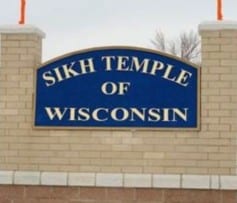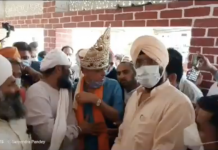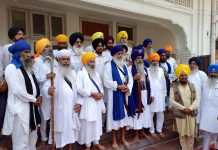DELHI— 

 From 1988 to 1993 I was a graduate student at New York University. Like many nonobservant Sikhs, I did not wear a turban, but I did keep a beard. When I would travel to small-town America, my appearance sometimes gave rise to a barely concealed hostility, occasionally even a comment or two.
From 1988 to 1993 I was a graduate student at New York University. Like many nonobservant Sikhs, I did not wear a turban, but I did keep a beard. When I would travel to small-town America, my appearance sometimes gave rise to a barely concealed hostility, occasionally even a comment or two.
I am not claiming that such incidents were the norm, but they were not uncommon.
Once, as I was stepping out of my own apartment in Jersey City with a bag slung over my shoulders, the police pulled out a gun and searched me. On another occasion, camping in North Carolina, I was made to stand in a police car’s high-beams with my hands over my head, again with a gun pointed at me, until the cops saw my white companions.
The years I am talking about precede 9/11 by a decade. As far as I can see,post 9/11, it has become considerably easier to express and act on such prejudices. My point, though, is this: these prejudices have always existed in the United States, and they are not restricted to white supremacists.
So while it’s understandable that in the wake of the Wisconsin killings President Barack Obama is intent on acknowledging the Sikhs’ contribution to the United States, the Sikh religion is being praised for its inclusiveness and some Sikhs hope to cast the incident as an opportunity to be better understood, these well-meaning efforts are absurd.
Does anyone really believe that if Sikhs are recognized for who they are, they will no longer be figures of hate?
Looking at the problem this way is a classic case of stigmatizing the victim instead of the perpetrator. The white supremacist views of Wade M. Page are what count. It is they that need to be confronted head on, and they cannot be confronted by pretending that they are the aberrant manifestation of an isolated fringe.
The [750,000] or more Sikhs in America should know something about this. Their encounter with prejudice dates back to their first wave of immigration to the West Coast at the beginning of the twentieth century.
After landing in Vancouver, Sikh immigrants soon began moving down the West Coast, working in lumber mills and at building the railways. As soon as 1907, in the town of Bellingham in Washington, white workers attacked Sikhs — whom they mistakenly termed Hindus — eventually cleansing the town.
A local newspaper editorialized: “From every standpoint it is most undesirable that these Asians should be permitted to remain in the United States. They are repulsive in appearance and disgusting in their manners. They are said to be without shame and, while no charges of immorality are brought against them, their actions and customs are so different from ours that there can never be tolerance of them.”
As Sikhs started buying land the backlash against them, as well as against the growing number of Japanese and Chinese immigrants, continued. The 1913 California Alien Land Law prevented them from owning land and even invalidated prior purchases. A U.S. Supreme Court decision of 1923 barred them from obtaining U.S. citizenship, upholding an act of Congress that “excluded from admission into this country all natives of Asia within designated limits of latitude and longitude, including the whole of India.” The law was overturned only in 1946, as India was about to gain its independence from Britain.
By recalling these incidents, I claim not to capture the entire history of Sikh migration to the United States, but simply to illustrate that the hatred white supremacists manifest against Sikhs today has deep roots. Rather than focus on who the Sikhs are, Americans should look back at their own history and decide what they want to be.





so let us have a great supply of luchis, jalebis, kichori to distribute to all, as we go about our lives in west?!
Vaheguroo, my sister says never be irked or irk anyone, as you don’t know when his/ her help will be needed, nevermind even if this individual has bias attitude, but Gurujio has better solution to our pain of being profiled/ feared as a threat in the west>
GurmanSingh
How to be Happy with Seva and Jalabian!
August 09, 2012 11:03AM
Daas mentioned before this story in a debate about what types of food we can eat. It’s clear that many Sakhi’s show how singhs used to prepare sweets for sangat. The following is a passage from the book “Episodes in the lives of the Guru’s”
KEY TO HAPPINESS
Once Mata ji developed some physical ailment. When the Guru came for his meals, she
prayed, “O True Emperor, I have suffered much pain. Pray give me comfort and relief from
this suffering.”
“O Mother, you want comfort and relief for yourself. Have you yourself ever given these to
anybody?” asked the Guru.
“In what way can I do that?” replied Mata ji.
“Have you ever served a meal to anybody? Have you ever offered cold water to anybody?
Have you ever fanned anybody? Have you ever massaged a tired person?”
“O True Emperor, because of you, there are so many people eager to serve food and
water, to wield the fan and to do the massaging, that many of them do not even get a turn
to perform these services. How can I do that?”
“Mata ji, he alone can get comfort or peace, who gives it to others. This is the Law laid
down by the Lord Himself. And if you have not given comfort to anybody, how can you
aspire for it yourself?”
“O True King, the past is past. In future I shall do as you say.”
“Very well said,” remarked the Guru, “now let us proceed like this. Let us hold a big feast,
cook wholesome, delicious food including luchis, jalebis, kichoris, and invite all the four
vamas. We should seek the pleasure and blessings of all.”
Mata ji complied with the wishes of the Guru. A huge feast was organised. All the four
vamos were invited. Followers of all the six systems of philosophy were invited, and all
near and dear ones as well as those distantly connected, joined. All showered their
blessings. The feast continued for several days, with no restrictions. “Dear Mother, now
you have earned the pleasure of so many. Therefore, you will also have comfort ahd
peace,” said the Guru. Thus ended Mata ji’s ailment. (33)
Bhul chuk muaf